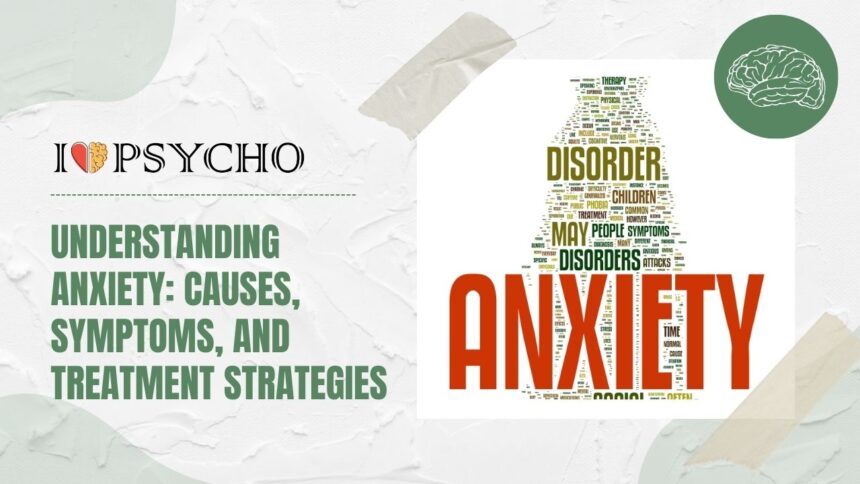Feeling on edge, worried, or restless from time to time is a common human experience. But for some, these emotions can spiral into something much more overwhelming – anxiety. In this blog post, we’ll dive deep into the world of anxiety: exploring its causes, symptoms, treatment options, and how you can support yourself or a loved one through it. Let’s unravel the complexities of anxiety together!
Defining Anxiety: What is it and who does it affect?
Anxiety is more than just feeling stressed or worried; it’s a complex emotional state that can manifest in various ways. It goes beyond the typical jitters before a big presentation – it can be all-consuming, affecting daily life and overall well-being.
Anyone, regardless of age, gender, or background, can experience anxiety. From students facing exam pressure to working professionals dealing with job stress, anxiety doesn’t discriminate. It can creep into your mind when you least expect it, causing excessive fear and unease.
Those grappling with anxiety may find themselves constantly on edge, struggling to concentrate or relax. Physical symptoms like rapid heart rate, sweating palms, and shallow breathing often accompany the mental anguish.
Understanding anxiety involves recognizing that it’s not just a passing phase but a legitimate mental health condition that requires attention and care. By shedding light on what anxiety truly entails, we pave the way for empathy and support for those navigating its turbulent waters.
Common Causes of Anxiety
Anxiety can stem from various sources, making it a complex emotion to pinpoint. One common cause of anxiety is stress – whether from work, relationships, or other life pressures. When stress levels become overwhelming, they can trigger feelings of unease and worry.
Another prevalent cause of anxiety is genetics. Research suggests that individuals with a family history of anxiety disorders may be more prone to experiencing similar issues themselves. Biological factors such as brain chemistry and hormonal imbalances also play a role in the development of anxiety.
Traumatic events like accidents, loss, or abuse can leave lasting emotional scars that manifest as anxiety. Chronic illnesses and certain medications can also contribute to feelings of anxiousness by affecting one’s physical well-being.
Furthermore, environmental factors such as upbringing and exposure to negative influences can shape how an individual responds to situations, potentially leading to heightened levels of anxiety. Understanding these various causes is essential in addressing and managing this complex mental health issue.
Signs and Symptoms of Anxiety
Anxiety can manifest in various ways, affecting both our minds and bodies. Some common signs include persistent worry, restlessness, and difficulty concentrating. Physical symptoms like rapid heartbeat, sweating, and trembling are also prevalent among those experiencing anxiety.
Additionally, individuals with anxiety may often feel fatigued or irritable without a clear reason. Insomnia or disrupted sleep patterns can further exacerbate these feelings of unease. Digestive issues such as stomach aches or nausea may accompany heightened anxious states as well.
Furthermore, avoidance behaviors towards certain situations that trigger anxiety are not uncommon. These could range from social gatherings to work-related responsibilities. It’s essential to recognize these signs early on to seek appropriate support and coping mechanisms for managing anxiety effectively.
By being mindful of these indicators, one can take proactive steps towards addressing their mental health needs before they escalate further.
The Impact of Untreated Anxiety
Living with untreated anxiety can have far-reaching consequences on various aspects of a person’s life. It can lead to chronic stress, affecting both physical and mental health. Sleep disturbances, digestive issues, and weakened immune system are common physical manifestations of untreated anxiety.
Untreated anxiety can also impair one’s ability to concentrate and make decisions, impacting academic or work performance. Relationships may suffer as individuals find it challenging to communicate effectively or engage in social activities due to overwhelming feelings of worry and fear.
Long-term untreated anxiety may increase the risk of developing other mental health disorders such as depression or substance abuse issues. It is essential to recognize the detrimental effects of leaving anxiety unaddressed and seek appropriate help and support when needed.
Treatment Options for Anxiety
Treatment options for anxiety vary depending on the individual’s needs and preferences. Therapy, such as cognitive-behavioral therapy (CBT), can help individuals identify and change negative thought patterns contributing to their anxiety. Medication, like SSRIs or benzodiazepines, may be prescribed by a healthcare provider to manage symptoms.
In addition to traditional treatment methods, holistic approaches like acupuncture, yoga, or mindfulness meditation have shown promising results in reducing anxiety levels. Lifestyle changes such as regular exercise, adequate sleep, and a balanced diet can also play a significant role in managing anxiety.
It’s essential to explore different treatment options and find what works best for you. Remember that it’s okay to try multiple approaches before finding the right fit. Always consult with your healthcare provider to create a personalized treatment plan tailored to your specific needs.
Self-Care Strategies for Managing Anxiety
Self-care plays a crucial role in managing anxiety and promoting overall well-being. Taking time for yourself is not selfish but essential for maintaining mental health. Start by incorporating relaxation techniques into your daily routine, such as deep breathing exercises or mindfulness meditation. These practices can help calm the mind and reduce stress levels.
Physical activity is another effective way to alleviate anxiety symptoms. Whether it’s going for a walk, practicing yoga, or hitting the gym, exercise releases endorphins that can boost your mood and energy levels. Prioritize getting enough sleep each night to support your body’s natural healing process and improve cognitive function during the day.
Maintaining a healthy diet rich in nutrients can also positively impact your mental health. Avoiding excessive caffeine and sugar intake while consuming whole foods like fruits, vegetables, and lean proteins can help stabilize mood fluctuations. Remember to stay hydrated throughout the day as dehydration can exacerbate feelings of anxiety.
Incorporating self-care activities that bring you joy and relaxation is equally important. Whether it’s reading a book, listening to music, spending time in nature, or engaging in creative hobbies, find what works best for you. Remember that self-care is not a luxury but a necessity when it comes to managing anxiety effectively.
Seeking Professional Help: When to Consider Therapy or Medication
Seeking professional help for anxiety is a crucial step towards managing your symptoms effectively. Therapists and psychiatrists can provide valuable support and guidance tailored to your specific needs. If you find that anxiety is significantly impacting your daily life, it may be time to consider therapy or medication.
Therapy sessions can help you explore the root causes of your anxiety, develop coping strategies, and work towards long-term healing. Cognitive-behavioral therapy (CBT) is a common approach used to address anxious thoughts and behaviors effectively.
In some cases, medication may also be recommended by a healthcare provider to alleviate severe symptoms of anxiety. Medications such as SSRIs or benzodiazepines can be effective in reducing overwhelming feelings of worry or panic.
Remember that seeking professional help does not mean weakness; it demonstrates strength and self-awareness in taking proactive steps towards better mental health. If you’re unsure about whether therapy or medication is right for you, consult with a qualified mental health professional who can guide you through the process without judgment.
Coping with Anxiety in Daily Life
Coping with anxiety in daily life can feel like a constant balancing act. It’s essential to prioritize self-care and find strategies that work for you.
One effective way to manage anxiety is through mindfulness techniques, such as deep breathing exercises or meditation. These practices help bring your focus back to the present moment and calm racing thoughts.
Physical activity is another powerful tool in coping with anxiety. Exercise releases endorphins, which are natural mood lifters that can help reduce feelings of stress and anxiety.
Creating a routine can also provide structure and stability, helping to alleviate some of the unpredictability that often fuels anxious feelings.
Additionally, connecting with others who understand what you’re going through can be incredibly beneficial. Whether it’s joining a support group or confiding in a trusted friend, sharing your experiences can offer comfort and perspective.
Remember, coping with anxiety is an ongoing process that may require trial and error to find what works best for you. Be patient with yourself as you navigate this journey towards better mental health.
Tips for Supporting a Loved One with Anxiety
Supporting a loved one who is struggling with anxiety can be challenging, but your presence and understanding can make a world of difference. First and foremost, listen without judgment when they need to talk. Sometimes being there to lend an ear is more valuable than offering advice.
Encourage them to practice self-care by engaging in activities that bring them joy or relaxation. Encouragement goes a long way in boosting their spirits during difficult times. Offer reassurance and validation of their feelings, letting them know that it’s okay not to be okay sometimes.
Educate yourself about anxiety disorders so you can better understand what your loved one is going through. This knowledge will enable you to provide the support they need effectively and compassionately. Be patient and empathetic; remember that healing takes time and setbacks are normal along the way.
Check-in regularly with simple gestures like sending a text message or making plans together – this shows your loved one that you care about their well-being consistently. Remind them that seeking professional help is nothing to be ashamed of; offer your assistance in finding resources for therapy or medication if needed.
Conclusion
It’s important to remember that anxiety is a common mental health condition that can impact anyone. By understanding the causes, symptoms, and treatment options available, individuals can take proactive steps towards managing their anxiety effectively. Whether through self-care strategies, professional help like therapy or medication, or support from loved ones, there are various ways to cope with and overcome anxiety. Remember that seeking help is not a sign of weakness but rather a courageous step towards better mental well-being. With proper care and support, it is possible to lead a fulfilling life despite experiencing anxiety.









